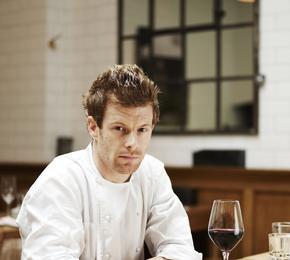 Tom Aikens is a London based chef and owner of the critically acclaimed Tom Aikens restaurant. Tom grew up in Norfolk; his family have helped shape his passion for enjoying quality food and, more recently, for marine conservation.
Tom Aikens is a London based chef and owner of the critically acclaimed Tom Aikens restaurant. Tom grew up in Norfolk; his family have helped shape his passion for enjoying quality food and, more recently, for marine conservation.
See Tom Aikens' website at: www.tomaikens.co.uk
What is your favourite seafood?
My favourite seafood is the most simply cooked and prepared, so something like a fresh grilled sole with a traditional nut brown butter, capers, lemon, shallots and a little parsley. Or a tartar of line caught sea bass, with an amazing olive oil, fresh lemon juice and herbs.
How did you get interested in the issue of sustainable seafood?
Seafood is one of the most important things to me, when using fish, not taking any notice of sustainability would just be criminal. I have always been very interested in the quality of fish and where it came from but previously had not really touched the bigger picture of sustainability and the effects of the fishing industry on the environment and marine life. My late father in-law, Nicholas Nuttall, was an avid supporter of the sea and the varied life it contains. Nicholas founded a conservation organization in the Bahamas called Bahamas Reef Environment Education Foundation, and he set me on this route learning about the impacts of fisheries and issues in marine conservation. I feel very strongly that being in the restaurant and hospitality industry is a great way to get a correct and direct message to people about the use of sustainably caught fish.
How would you describe your philosophy on ocean conservation?
The responsibility for safe guarding fish and its future lies with all of us, every single person on the planet. We all have to safe guard the planet and the seas, everybody in the supply chain from net to plate has to be responsible. If all of us are collectively responsible instead of the finger being pointed at the fisherman then it may be a little easier for all concerned.
Little things matter and will help contribute to the bigger picture, just like how turning the standby switch off on the TV can help reduce climate change. Consumers can also be responsible for what they choose to buy, the public have the purchasing power. For example choosing MSC labeled fish guarantees it has come from a well managed fish stock. Supermarkets of course have a huge responsibility and they are all getting better.
We must stop the blame – be it of fishermen or governments – and just get changes put in place, with the help of NGOs and a bigger education for consumers and public on what is really happening. Then we may get the chance to make things better for the future of the local inshore fisheries and for the planet. If only the fish could have a vote or communicate what they want.
Have your customers noticed the focus on sustainability?
It is very important to get the correct message across to the customer and that they have trust and faith in the product that they are eating and where it has come from. The customer is very important in a sense of communicating and spreading the words of something they believe in. Our customers are very positive about it and really take an interest in our products and love having a connection from me to the fishermen as well.
Do you feel it limits what you can offer?
No not at all. The limit to the fish that you can use has not changed its just the sourcing of the fish that has, which takes more work but its worth the extra effort.
It is also a great thing to be using different fish as well, which are more sustainable, like megrim sole, gurnard, pollock and coley. Again, it is getting the information and education that there is other species of fish that we can eat other than the usual suspects of cod, haddock, plaice or (farmed) salmon. I would say that some of the suppliers have been helpful, though conversely there were also those that have not been so forthcoming as well.
Good Catch: Good Catch provides practical information for chefs, caterers and restaurateurs, making it easier for them to serve more sustainable seafood.
